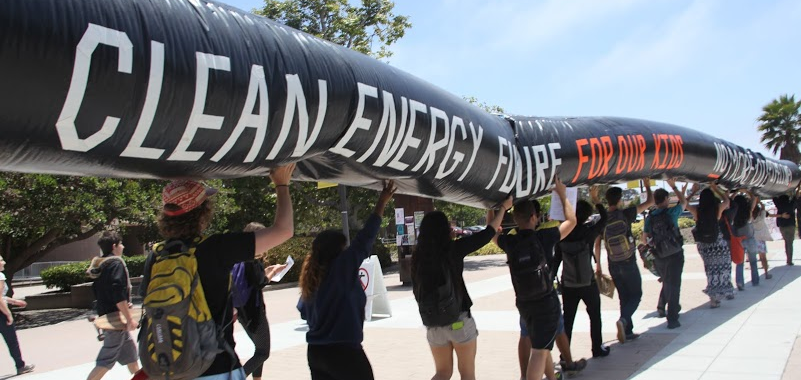By: Emily Williams
“It’s not your fault.”
In the movie Goodwill Hunting, Robin Williams repeats this line over and over to Matt Damon, helping him accept that the trauma he faced, in fact, wasn’t his fault.
I can’t help that that mantra crosses my mind every time I’m confronted with anther exploding oil train or of a child diagnosed with cancer next to a power plant. “It’s not your fault.”
Two weeks ago, a pipeline that was pumping crude oil from off-shore platforms to onshore facilities ruptured in Santa Barbara County, spilling over 100,000 gallons of crude oil onto the coastline and into the sea. The slick currently spans over 10 miles of previously pristine coastline. The only silver lining is that the spill didn’t occur in a more populated area.
Yet I am completely dependent on fossil fuels. A shameless alliance of government, big oil, and king coal has ensured that our infrastructure depends entirely upon coal, oil, and natural gas. These fuels heat our homes, power our cars, produce our plastics, and power the very computer I wrote this on.
But just because we are currently reliant on something doesn’t mean we should continue to be. Our society used to rely on DDT to protect our crops from pests. Yet once it was proven how toxic the substance was, we banned it, turning to alternatives. We now know that fossil fuel extraction and combustion is more toxic to our communities and environment than DDT. When we turn on our fossil-fuel powered light, we cast an ugly shadow. At the other end of those power lines are horrendous human rights violations and irreversible environmental degradation. This spill is not an isolated incident. Exploding oil trains, oil spills, fracking-induced earthquakes, and coal slurry mud-slides have become a staple of nighttime news. Coal alone is estimated to have over $300 billion[1]in external costs; that is $300 billion worth of costs that the companies force onto taxpayers and the environment. In three weeks this year, three oil trains derailed and exploded, and in the case of the West Virginia exploding train, the fire that engulfed 19 rail cars burned for three days[2]. Over 25 million Americans live within the “blast zone” along oil train routes[3]. But the fossil fuel assault has a global front as well—climate change. According to the Climate Vulnerability Monitor, already 400,000 people die per year as a result of climate change[4]. While this number is already too high, future generations can expect a much higher figure.
These impacts are not evenly distributed to those who are the most responsible for emissions. Fossil fuel extraction and combustion occurs mostly in or near communities of low socio-economic status-primarily communities of color. These communities are plagued with elevated rates of asthma, cardiovascular illness, and cancer, and have very little political power to fight the infrastructure. However, on the few occasions when this happens next door to the companies’ CEOs, suddenly there is an uproar. When a company wanted to install a fracking water tower on the land of Rex Tillerson—the CEO of Exxon Mobil—he fought it. Turns out Rex is only interested in fracking in other peoples’ back yards.
No matter our political inclinations, we all have to accept that these fuels are undermining the health, economy, and prosperity of our society.
So what’s the solution? Contrary to popular belief, we have the alternatives to actually transition away from fossil fuels and power our economy. Improving energy efficiency in buildings can cut 10% of emissions on its own[5]. Solar and wind are not only technically viable alternative fuels, but also financially feasible[6]. Germany, a country that lies at the same latitude as Alaska, and is covered in clouds for the majority of the year, already gets 30% of its energy from renewable sources[7].

It’s not our fault…entirely. The American public is being misled. While mainstream media debates are torn between the “skeptic” and scientist, alluding to the jury still being out, 97% of all climate scientists are in consensus that climate change is happening, the risk is great, and humans are the cause of it. How can this be? As it turns out, the fossil fuel industry pays big time for media campaigns to spread doubt and green-wash their businesses. This “dark money” is extremely hard to trace, but what is known is that 140 fossil-fuel-financed foundations donated over $550 million to climate change denial campaigns[8]. For a more specific look, BP invests heavily in their PR campaign to recast themselves as “Beyond Petroleum”, while the company only invested $9 billion over the last decade in renewable technology development, compared to the $341 billion they spent in the same period on unconventional methods, such as fracking[9]. Comparing those figures to the $257 billion that was invested globally in 2011 in renewables, $9 is barely a drop in the ocean[10]. To top it all off, according to the IMF, the fossil fuel industry as a whole receives $10 million in subsidies per minute, accumulating to over $5 trillion annually.
In 1961, the Soviet Union announced it would send a man to the moon. Flexing its national muscle, the United States in a mere eight years went from zero to moon landing. Back on Earth, in that very same year, an oil rig off the coast of Santa Barbara suffered a blow-out and spewed over 3 million gallons of oil into the channel.
If the United States could so quickly develop the technology, political will, and finance to land a man on the moon, then we can transition to a low-carbon economy. This feat will require our society to rethink our priorities. We’ll need to stop subsidizing the industry that actively blocks alternatives and start holding the industry accountable. The Intergovernmental Panel on Climate Change stated in their most recent report that to truly tackle the issue of climate change, we need investment to spur the renewable energy revolution. We could invest that annual $5 trillion of subsidies to finance research on renewable energy technology, rather than empowering an industry whose business model continues to fight the transition to a low-carbon economy.
It’s not our fault. We haven’t been given the opportunity to own our own power, to choose our own energy provider, or to be represented by a politician who hasn’t been bought out. But it will be our fault if we remain comfortably blind to the mass profiting from what can only be called institutionalized insanity.
References
[1]External Costs of Energy
[2] http://insideclimatenews.org/news/20141208/video-boom-north-americas-explosive-oil-rail-problem
[3] http://explosive-crude-by-rail.org/
[5] http://www.theguardian.com/environment/2012/jun/08/energy-efficiency-carbon-savings
[6] http://www.scientificamerican.com/article/the-age-of-wind-and-solar-is-closer-than-you-think/
[7] http://www.ise.fraunhofer.de/de
[8] https://www.scientificamerican.com/article/dark-money-funds-climate-change-denial-effort/
[9] http://www.bloomberg.com/bw/articles/2012-05-10/big-oils-big-in-biofuels
[10] http://fs-unep-centre.org/publications/global-trends-renewable-energy-investment-2012

